状语从句练习题及答案)
- 格式:doc
- 大小:56.50 KB
- 文档页数:6
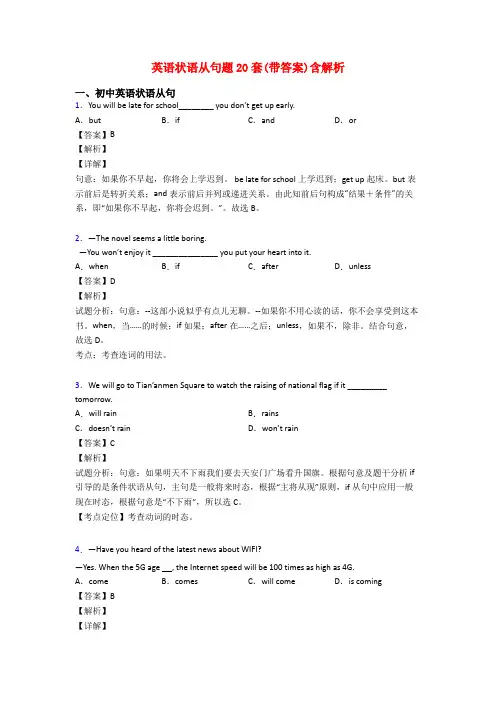
英语状语从句题20套(带答案)含解析一、初中英语状语从句1.You will be late for school________ you don’t get up early.A.but B.if C.and D.or【答案】B【解析】【详解】句意:如果你不早起,你将会上学迟到。
be late for school上学迟到;get up起床。
but表示前后是转折关系;and表示前后并列或递进关系。
由此知前后句构成“结果+条件”的关系,即“如果你不早起,你将会迟到。
”。
故选B。
2.—The novel seems a little boring.—You won’t enjoy it _______________ you put your heart into it.A.when B.if C.after D.unless【答案】D【解析】试题分析:句意:--这部小说似乎有点儿无聊。
--如果你不用心读的话,你不会享受到这本书。
when,当……的时候;if如果;after在……之后;unless,如果不,除非。
结合句意,故选D。
考点:考查连词的用法。
3.We will go to Tian’anmen Square to watch the raising of national flag if it _________ tomorrow.A.will rain B.rainsC.doesn’t rain D.won’t rain【答案】C【解析】试题分析:句意:如果明天不下雨我们要去天安门广场看升国旗。
根据句意及题干分析if 引导的是条件状语从句,主句是一般将来时态,根据“主将从现”原则,if从句中应用一般现在时态,根据句意是“不下雨”,所以选C。
【考点定位】考查动词的时态。
4.—Have you heard of the latest news about WIFI?—Yes. When the 5G age , the Internet speed will be 100 times as high as 4G.A.come B.comes C.will come D.is coming【答案】B【解析】【详解】句意:——你听说过无线网络的最新消息吗?——是的。
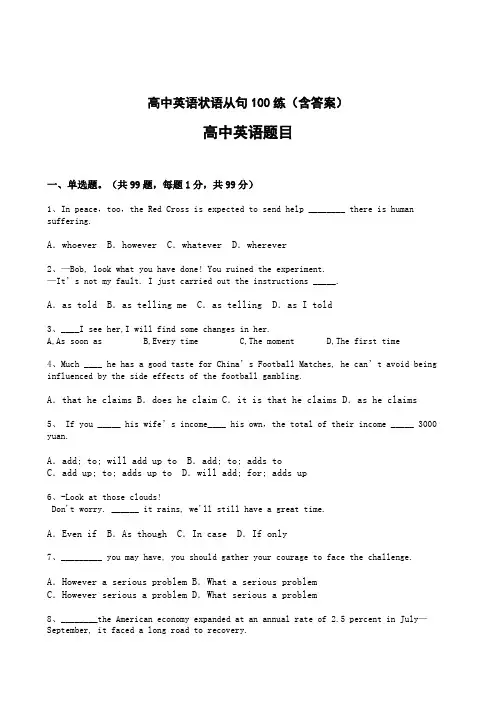
高中英语状语从句100练(含答案)高中英语题目一、单选题。
(共99题,每题1分,共99分)1、In peace,too,the Red Cross is expected to send help ________ there is human suffering.A.whoever B.however C.whatever D.wherever2、—Bob, look what you have done! You ruined the experiment.—It’s not my fault. I just carried out the instructions _____.A.as told B.as telling me C.as telling D.as I told3、____I see her,I will find some changes in her.A,As soon as B,Every time C,The moment D,The first time4、Much ____ he has a good taste for China’s Football Matches, he can’t avoid being influenced by the side effects of the football gambling.A.that he claims B.does he claim C.it is that he claims D.as he claims5、 If you _____ his wife’s income____ his own,the total of their income _____ 3000 yuan.A.add; to; will add up to B.add; to; adds toC.add up; to; adds up to D.will add; for; adds up6、-Look at those clouds!Don't worry. ______ it rains, we'll still have a great time.A.Even if B.As though C.In case D.If only7、_________ you may have, you should gather your courage to face the challenge.A.However a serious problem B.What a serious problemC.However serious a problem D.What serious a problem8、________the American economy expanded at an annual rate of 2.5 percent in July—September, it faced a long road to recovery.A.Since B.IfC.While D.When9、Please come to visit me if _________________.A.you are convenient B.it is convenient of youC.you are for convenience D.it is convenient for you10、The famous scientist grow up________ he was born and in 1930 he came to Shanghai.A.when B.in which C.where D.wherever11、___ , he still put people’s life in the first place.A.However he was tired B.Now matter he was tiredC.Now matter how was he tired D.However tired he was12、I have been keeping the portrait _____ I can see it every day, as it always reminds me of my childhood in Paris.A.since B.where C.as D.if13、—Don’t look down upon Bob. He has his own advantages.—Oh, yes. others are weak, he is strong.A.If B.WhereC.When D.Though14、It’s such a good place___ everyone wants to go and visit ___ it is well-known all over the world.A.that; that B.as; as C.as; that D.that; as15、This is my own restaurant. You can come to eat here ____ you like.A.wherever B.whatever C.whichever D.whenever16、He is rather difficult to make friends with, but his friendship, _____ is more true than anyone else’s.A.Once gaining B.Once gained C.Once is gaining D.Once he gained17、_____unemployment and crime are high, it can be assumed that the latter is due to the former.A.Before B.Where C.Unless D.Until18、Jack wasn't allowed to go into the sports club ______ he left his membership card at home.A.though B.as C.before D.Until19、 _________ you may have, you should gather your courage to face the challenge.A.Whatever serious a problem B.However serious a problemC.However a serious problem D.No matter how a serious problem20、All the soldiers were placed exactly the local government wanted themfor the control of the comeback of the flood.A.while B.when C.where D.though21、We climbed higher _____ we might see the scenes better.A.sothat B.even though C.in case D.as if22、Would you please put the dictionary it belongs?A.where B.to which C.to whom D.what23、The people in the disaster areas are ready to accept _______ help they can get.A.whichever B.however C.whatever D.whenever24、 --- Don’t look down upon Bob. He has his own advantages.----Oh, yes. ______ others are weak, he is strong.A.If B.Where C.When D.Though25、(2014·江苏四校第四次考试)I can not understand why the issue of Syria has become so complicated________I learn more from the media.A.after B.beforeC.while D.when26、He never speaks to others until ______.A.he speaks B.spoken to C.he is spoken D.he speaks to27、You should report any incident, _______ minor it is.A.whatever B.whenever C.however D.wherever28、---- Did he come back early last night?---- Yes. It was not yet eight o’clock _______ he arrived home.A.when B.that C.before D.until29、 Everything was placed exactly ___________he wanted it for the graduation ceremony.A.while B.when C.where D.though30、This is a very cute dog. I’ll take it, .A.how much may it cost B.how much it may cost.C.however much it may cost D.no matter how it may cost31、He tried his best to solve the problem, difficult it was.A.no matter what B.whatever C.however D.how32、My parents have promised to come to see me before I ______ for Africa.A.have left B.leave C.left D.will leave33、Peter was so excited __________ he received an invitation from his friend to visit them.A.where B.that C.why D.when34、_______, you will get used to the life here and have your understanding of life.A.As time going by B.With time passing outC.As time goes by D.With time goes by35、in Super Girls that Duan Linxi became known to almost all teenagers.A.So successful her performance wasB.So successful was her performanceC.So her performance was successfulD.So was her successful performance36、I lost sight of Wang Ping when we reached _____ looked like a large market because of too many carriages flying by in all directions.A.that B.what C.where D.which37、______ this village was extremely poor, they felt it was still important to keep the school going.A.So long as B.Though C.Even as D.As if38、How did you manage to get to the school on time_________you missed the schoolbus?A.when B.ifC.once D.because39、--- Have you told Joan the bad news that her grandfather fell off the bike and hurt seriously?--- Yes. I told her ________I saw her this afternoon.A.while B.the moment C.until D.Suddenly40、____, as long as I’m with nature, I don’t care.A.However tough the journey isB.Whatever tough the journey isC.However the journey is toughD.Whatever the journey is tough41、42、The little boy who got lost decided to remain ________ she was and wait for her mother.A.what B.how C.who D.where43、Once ____ in the forest, you ought to remain ____ you are waiting for help.A.losing; where B.losing; there C.lost; there D.lost; where44、 I _______ to the party if I________tomorrow.A.will go; will be invitedB.will go; am invitedC.go; will inviteD.go, have been invited45、It will really make no difference ________ he doesn’t come tonight.A.if B.whether C.that D.what46、 In my opinion, we need to begin ______ we stopped yesterday to ensure we won’t miss anything.A.when B.where C.how D.what47、(2013·北京,30)I took my driving license with me on holiday,________I wanted to hire a car.A.in case B.even ifC.ever since D.if only48、_____he entered the room,he picked up the phone and told the news to his parents.A,At the moment B,Hardly C,The moment D,No soon49、_____________grades you get in this exam, you should never lose heart.A.No matter how B.What C.No matter what D.Which50、—____________ difficulty you meet, remember that it might just be a touchstone. —You are right. __________ difficult it is, we will never give in.A.However; whatever B.However; however C.Whatever; whatever D.Whatever; however51、 ______ you may have , you should gather your courage to face the challenge .A.However serious a problem B.Whatever serious a problemC.However a serious problem D.No matter how a serious problem52、—What should I wear to attend his wedding party?—Dress ____ you like.A.what B.however C.whatever D.how53、I don't believe we've met before, I must say you do look familiar.A.therefore B.althoughC.since D.unless54、55、John thought it wouldn’t be long he was ready for his new job.A.since B.when C.before D.after56、 It was _____that we went camping on the mountain.A.such nice weather B.so nice a weather C.such a nice weather D.too nice weather57、 Everything was placed exactly _______ he wanted it for the graduation ceremony.A.though B.where C.while D.when58、They promised to develop a software package by the end of this year, ________ they might have.A.however difficult B.how difficultC.whatever difficulty D.what difficulty59、--- Did Peter come back early last night?--- Yes. It was not yet eight o’clock _________ he arrived home.A.when B.that C.until D.before60、The big secret in life is that there is no big secret. __________ your goal, you can get there if you’re willing to work.A.However B.Whichever C.Wherever D.Whatever61、you may have, you should gather your courage to face the challenge.A.However a serious problem B.What a serious problemC.However serious a problem D.What serious a problem62、 Please arrange an interview with the manager tomorrow , or it is convenient to him .A.whenever B.however C.whichever D.wherever63、Nowadays workers are earning per month as they did in the 1990s.A.twice as much as B.as twice as muchC.as much twice as D.twice as much64、Hot _______the night air was, we slept deeply because we were so tired after the long journey.A.although B.as C.while D.however65、– Didn’t you tell Harry not to play games so much?–I said to him goes in one ear and out the other.A.No matter how B.HoweverC.No matter what D.Whatever66、After the war, a new school building was put up ______there had once been a theatre. A.when B.in which C.the place where D.where67、 Here we have beef, fish and fruit. Help yourself to ______ you like.A.whichever B.however C.whatever D.whenever68、If someone falls off the ladder and gets seriously hurt, you’d better leave him_____ he falls and try to get help.A.before B.when C.where D.what69、—Have you known each other for long?—Not very long, we started to work in the company.A.after B.before C.when D.since70、It’s the second time ___ I’ve read an English novel. But do you know there was a time ___I hated English?A.that; that B.when; thatC.that; when D.when; when71、________ your composition carefully, some spelling mistakes can be avoided. A.Having checked B.Checking C.If you check D.To check72、—Where did you lose your bicycle?—It was in the playground______I played basketball.A.that B.where C.which D.when73、Every evening after dinner, if not from work,, I will spend some timewalking my dog.A.being tired B.tiringC.tired D.to be tired74、A serious illness, ______ its nature, is almost always painful.A.whatever B.wherever C.whenever D.however75、Every evening after dinner, if not ___________ from work, I will spend some time walking my dog.A.being tired B.tiring C.to be tired D.tired76、House prices vary from place to place and are usually high ____ there are famous schools.A.since B.when C.whether D.where77、No matter ______ the CRH accident in Wenzhou, it had and will have much warning significance.A.how the investigators said causedB.what the investigators said causedC.why the investigators said causedD.the investigators said how caused78、The famous scientist grew up _______ he was born and in 1950 he came to Nanjing .A.When B.wheneverC.where D.wherever79、It’s such a good place___ everyone wants to go and visit ___ it is well-known all over the world.A.that; that B.as; as C.as; that D.that; as80、_______ this sentence a second time, the meaning will become clear to you.A.If reading B.When you read C.Reading D.Read81、______ we think of Ben, we have to admit that he is a highly competent man.A.However B.Whether C.Whichever D.Whatever82、No matter how________, it is not necessarily lifeless.A.dry a desert may be B.a desert may be dryC.may a desert be dry D.dry may a desert be83、 I’ll go to the party with you ________ you don’t wear those strange trousers.A.as though B.in order that C.in that D.providing84、You should report any incident, ______ minor it is.A.whatever B.whenever C.however D.wherever85、_________, I always feel I want a few more days.A.However long is a vacation B.However long a vacation isC.However is a vacation long D.However a vacation is long86、When ______ if he had any idea of what the novel was about, Jack just kept silent.A.asking B.askedC.to ask D.being asked87、Cold ______ the night air was, he slept soundly because he was so tired after working for a whole day.A.although B.while C.however D.as88、The little boy who got lost decided to remain ________ she was and wait for her mother.A.what B.how C.who D.where89、______ around the Water Cube , we were taken to see the Bird’s Nest for the 2008 Olympic Games.A.Having shown B.To be shown C.Having been shown D.To show90、Every evening after dinner, if not ______ in reading books, she can be found _____ on the sofa watching TV.A.absorbed; seating B.absorbing; satC.absorbed; seated D.absorbing; sitting91、 Children should be instructed to put things they belong in their early childhood.A.where B.in whichC.to which D.what92、 When ______ help, one often says “Thank you.” or “It’s kind of you.”A.offering B.to offer C.to be offered D.offered93、______ advice I give him , he just does not listen.A.However B.No matter how C.No matter D.Whatever94、The lawyer seldom wears anything other than a suit _____ the season.A.whatever B.wherever C.whenever D.however95、His idea was such a good one ______ we all agreed to use it.A.as B.that C.so D.but96、John shut everybody out of the kitchen ________ he could prepare his grand surprise for the party.A.which B.when C.so that D.as if97、If you visit our home or ring the doorbell, you by our dog.A.were greeted B.will greet C.will be greeted D.greeted98、Though ______ to see us, the professor gave us a warm welcome.A.surprised B.was surprised C.surprise D.being surprised99、._______ we can afford it, we wouldn’t go abroad for our vacation.A.As long as B.WheneverC.Even though D.In case1、答案:D2、答案:A试题分析:考查状语从句的省略。
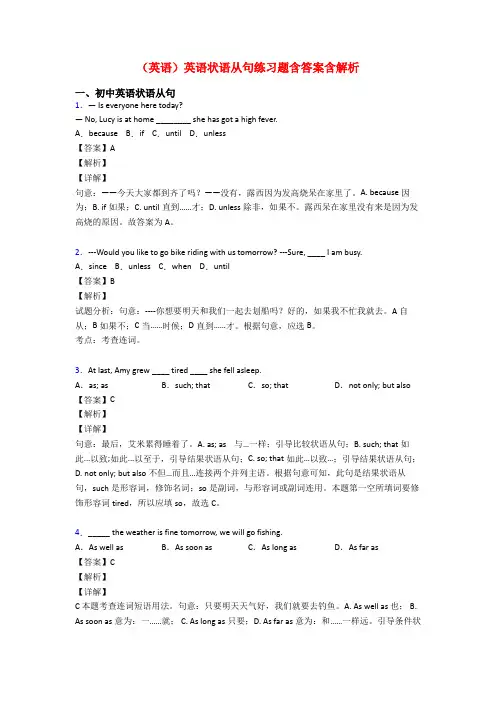
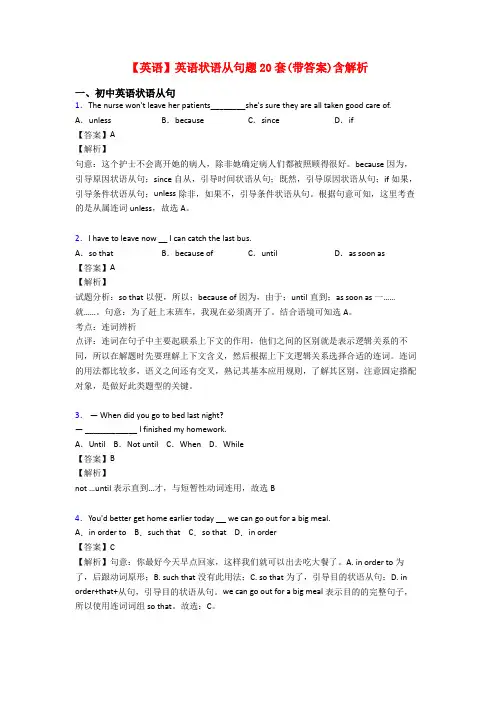
【英语】英语状语从句题20套(带答案)含解析一、初中英语状语从句1.The nurse won't leave her patients________she's sure they are all taken good care of. A.unless B.because C.since D.if【答案】A【解析】句意:这个护士不会离开她的病人,除非她确定病人们都被照顾得很好。
because因为,引导原因状语从句;since自从,引导时间状语从句;既然,引导原因状语从句;if如果,引导条件状语从句;unless除非,如果不,引导条件状语从句。
根据句意可知,这里考查的是从属连词unless,故选A。
2.I have to leave now __ I can catch the last bus.A.so that B.because of C.until D.as soon as【答案】A【解析】试题分析:so that以便,所以;because of因为,由于;until直到;as soon as一……就……。
句意:为了赶上末班车,我现在必须离开了。
结合语境可知选A。
考点:连词辨析点评:连词在句子中主要起联系上下文的作用,他们之间的区别就是表示逻辑关系的不同,所以在解题时先要理解上下文含义,然后根据上下文逻辑关系选择合适的连词。
连词的用法都比较多,语义之间还有交叉,熟记其基本应用规则,了解其区别,注意固定搭配对象,是做好此类题型的关键。
3.— When did you go to bed last night?— ____________ I finished my homework.A.Until B.Not until C.When D.While【答案】B【解析】not …until 表示直到…才,与短暂性动词连用,故选B4.You'd better get home earlier today we can go out for a big meal.A.in order to B.such that C.so that D.in order【答案】C【解析】句意:你最好今天早点回家,这样我们就可以出去吃大餐了。
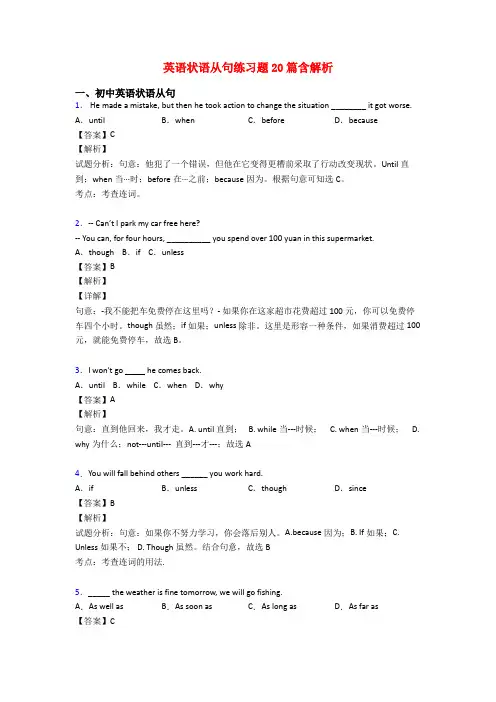
英语状语从句练习题20篇含解析一、初中英语状语从句1. He made a mistake, but then he took action to change the situation ________ it got worse. A.until B.when C.before D.because【答案】C【解析】试题分析:句意:他犯了一个错误,但他在它变得更糟前采取了行动改变现状。
Until直到;when当···时;before在···之前;because因为。
根据句意可知选C。
考点:考查连词。
2.-- Can’t I park my car free here?-- You can, for four hours, __________ you spend over 100 yuan in this supermarket. A.though B.if C.unless【答案】B【解析】【详解】句意:-我不能把车免费停在这里吗?- 如果你在这家超市花费超过100元,你可以免费停车四个小时。
though 虽然;if 如果;unless 除非。
这里是形容一种条件,如果消费超过100元,就能免费停车,故选B。
3.I won't go he comes back.A.until B.while C.when D.why【答案】A【解析】句意:直到他回来,我才走。
A. until 直到; B. while当---时候; C. when当---时候; D. why为什么;not---until--- 直到---才---;故选A4.You will fall behind others ______ you work hard.A.if B.unless C.though D.since【答案】B【解析】试题分析:句意:如果你不努力学习,你会落后别人。
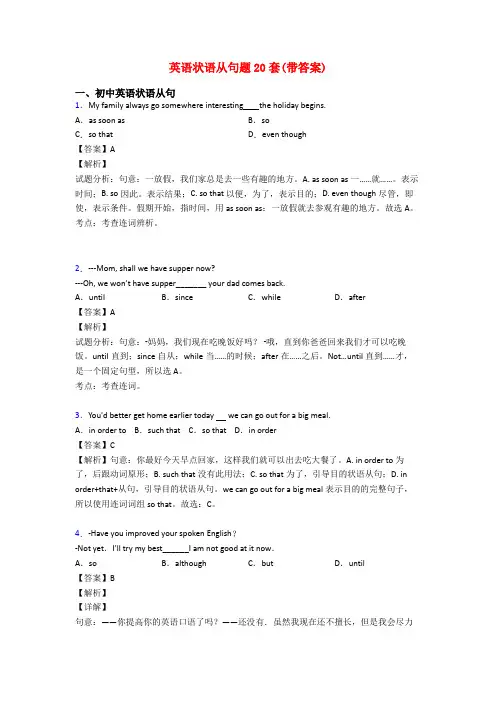
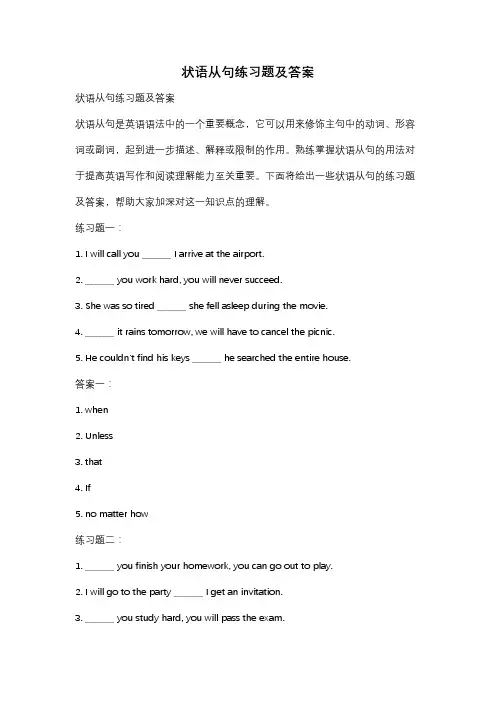
状语从句练习题及答案状语从句练习题及答案状语从句是英语语法中的一个重要概念,它可以用来修饰主句中的动词、形容词或副词,起到进一步描述、解释或限制的作用。
熟练掌握状语从句的用法对于提高英语写作和阅读理解能力至关重要。
下面将给出一些状语从句的练习题及答案,帮助大家加深对这一知识点的理解。
练习题一:1. I will call you _______ I arrive at the airport.2. _______ you work hard, you will never succeed.3. She was so tired _______ she fell asleep during the movie.4. _______ it rains tomorrow, we will have to cancel the picnic.5. He couldn't find his keys _______ he searched the entire house.答案一:1. when2. Unless3. that4. If5. no matter how练习题二:1. _______ you finish your homework, you can go out to play.2. I will go to the party _______ I get an invitation.3. _______ you study hard, you will pass the exam.4. _______ it snows, we will build a snowman.5. She always cries _______ she watches sad movies.答案二:1. Once2. if3. If4. If5. whenever练习题三:1. _______ she is busy, she always finds time to exercise.2. _______ you eat too much, you will gain weight.3. _______ he is tired, he will keep working.4. _______ you don't hurry, you will miss the train.5. _______ she called, I was already asleep.答案三:1. Although2. If3. Even if4. Unless5. When练习题四:1. _______ I go, I always take my camera with me.2. _______ you don't study, you won't pass the test.3. _______ it is cold, I will go for a run.4. _______ she likes him, she never shows it.5. _______ you don't like it, you don't have to eat it.答案四:1. Wherever2. If3. Even if4. Although5. If通过以上练习题,我们可以看到状语从句的用法有很多种,包括时间、条件、原因、方式等等。
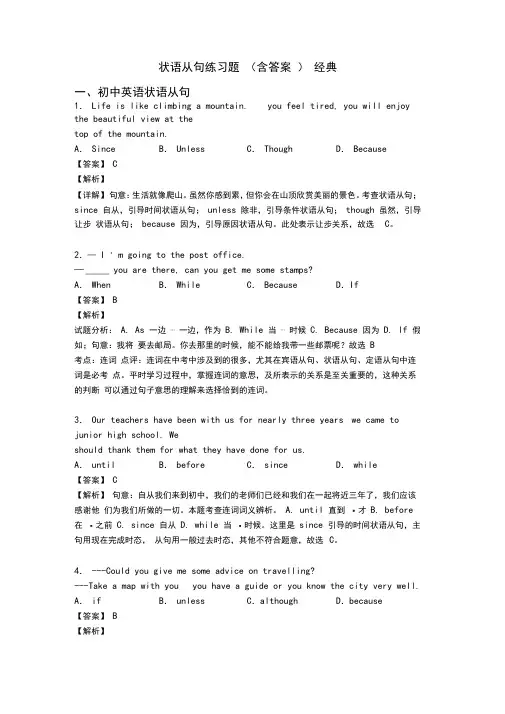
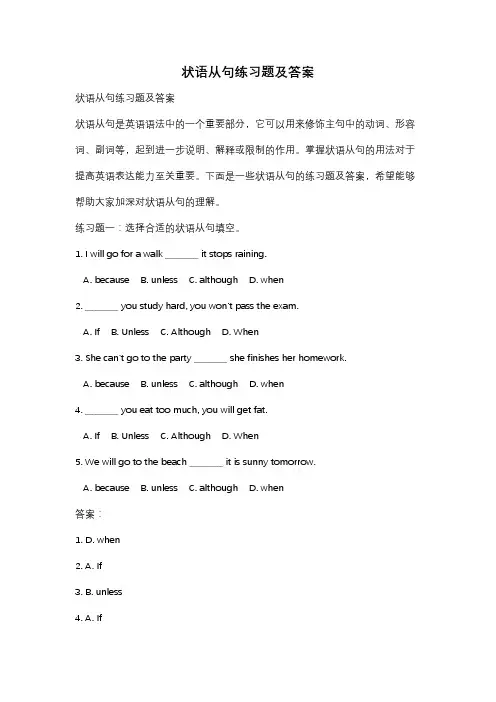
状语从句练习题及答案状语从句练习题及答案状语从句是英语语法中的一个重要部分,它可以用来修饰主句中的动词、形容词、副词等,起到进一步说明、解释或限制的作用。
掌握状语从句的用法对于提高英语表达能力至关重要。
下面是一些状语从句的练习题及答案,希望能够帮助大家加深对状语从句的理解。
练习题一:选择合适的状语从句填空。
1. I will go for a walk ________ it stops raining.A. becauseB. unlessC. althoughD. when2. ________ you study hard, you won't pass the exam.A. IfB. UnlessC. AlthoughD. When3. She can't go to the party ________ she finishes her homework.A. becauseB. unlessC. althoughD. when4. ________ you eat too much, you will get fat.A. IfB. UnlessC. AlthoughD. When5. We will go to the beach ________ it is sunny tomorrow.A. becauseB. unlessC. althoughD. when答案:1. D. when2. A. If3. B. unless4. A. If5. D. when练习题二:根据句意选择正确的状语从句。
1. ________ you work hard, you won't achieve your goals.A. IfB. UnlessC. AlthoughD. When2. I will go to the park ________ it stops raining.A. becauseB. unlessC. althoughD. when3. She can't go to the party ________ she finishes her homework.A. becauseB. unlessC. althoughD. when4. ________ you eat too much, you will get sick.A. IfB. UnlessC. AlthoughD. When5. We will go to the concert ________ it is not too crowded.A. becauseB. unlessC. althoughD. when答案:1. A. If2. B. unless3. B. unless4. A. If5. D. when练习题三:根据句意填写合适的状语从句。
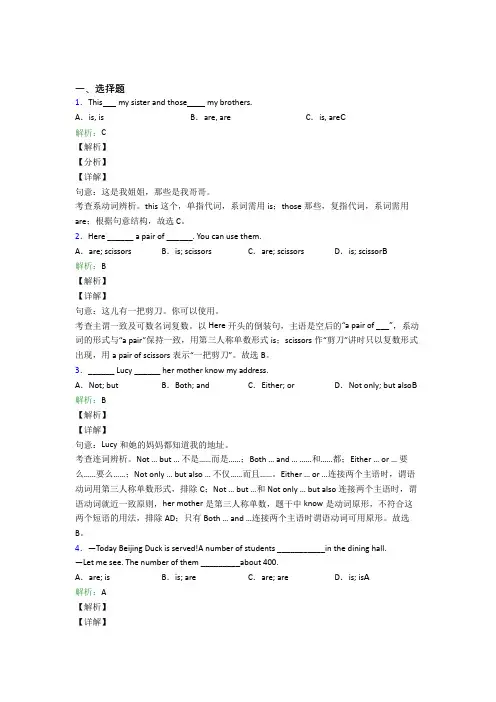
一、选择题1.This my sister and those my brothers.A.is, is B.are, are C.is, are C解析:C【解析】【分析】【详解】句意:这是我姐姐,那些是我哥哥。
考查系动词辨析。
this这个,单指代词,系词需用is;those那些,复指代词,系词需用are;根据句意结构,故选C。
2.Here ______ a pair of ______. You can use them.A.are; scissors B.is; scissors C.are; scissors D.is; scissor B解析:B【解析】【详解】句意:这儿有一把剪刀。
你可以使用。
考查主谓一致及可数名词复数。
以Here开头的倒装句,主语是空后的“a pair of ___”,系动词的形式与“a pair”保持一致,用第三人称单数形式is;scissors作“剪刀”讲时只以复数形式出现,用a pair of scissors表示“一把剪刀”。
故选B。
3.______ Lucy ______ her mother know my address.A.Not; but B.Both; and C.Either; or D.Not only; but also B 解析:B【解析】【详解】句意:Lucy和她的妈妈都知道我的地址。
考查连词辨析。
Not … but … 不是……而是……;Both … and … ……和……都;Either … or … 要么……要么……;Not only … but also … 不仅……而且……。
Either … or …连接两个主语时,谓语动词用第三人称单数形式,排除C;Not … but …和Not only … but also连接两个主语时,谓语动词就近一致原则,her mother是第三人称单数,题干中know是动词原形,不符合这两个短语的用法,排除AD;只有Both … and …连接两个主语时谓语动词可用原形。
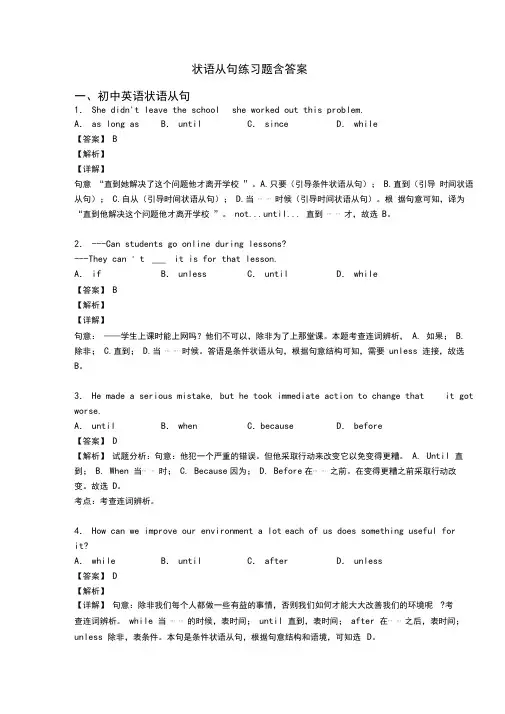
状语从句练习题含答案一、初中英语状语从句1.She didn't leave the school she worked out this problem.A.as long as B.until C.since D.while【答案】B【解析】【详解】句意“直到她解决了这个问题他才离开学校”。
A.只要(引导条件状语从句);B.直到(引导时间状语从句);C.自从(引导时间状语从句);D.当⋯⋯时候(引导时间状语从句)。
根据句意可知,译为“直到他解决这个问题他才离开学校”。
not...until... 直到⋯⋯才,故选B。
2.---Can students go online during lessons?---They can ' t ___ it is for that lesson.A.if B.unless C.until D.while【答案】B【解析】【详解】句意:——学生上课时能上网吗?他们不可以,除非为了上那堂课。
本题考查连词辨析,A. 如果;B.除非;C.直到;D.当⋯⋯时候。
答语是条件状语从句,根据句意结构可知,需要unless 连接,故选B。
3.He made a serious mistake, but he took immediate action to change that it got worse.A.until B.when C.because D.before【答案】D【解析】试题分析:句意:他犯一个严重的错误。
但他采取行动来改变它以免变得更糟。
A. Until 直到;B. When 当⋯⋯时;C. Because因为;D. Before在⋯⋯之前。
在变得更糟之前采取行动改变。
故选D。
考点:考查连词辨析。
4.How can we improve our environment a lot each of us does something useful forit?A.while B.until C.after D.unless【答案】D【解析】【详解】句意:除非我们每个人都做一些有益的事情,否则我们如何才能大大改善我们的环境呢?考查连词辨析。
英语状语从句练习题及答案一、初中英语状语从句-Shall we go for a picnic in the forest park tomorrow? -Yes,it rains heavily.A. if1B. unlessC. untilD. When【答案】B【解析】试题分析:句意:一明天我们在森林公园进行野餐怎么样?一是的,如果雨下的不大。
A. if'如果;B. unless除非;C.Until直到;D. When当……的时候。
结合句意可知是unless引导的条件状语从句,故选B考点:考查连词的用法。
1.I have to leave now _ I can catch the last bus.A. so thatB. because ofC. untilD. as soon as【答案】A【解析】试题分析:so that以便,所以;because of因为,由于;until直到;as soon as -……就……。
句意:为了赶上末班车,我现在必须离开了。
结合语境可知选A。
考点:连词辨析点评:连词在句子中主要起联系上下文的作用,他们之间的区别就是表示逻辑关系的不同,所以在解题时先要理解上下文含义,然后根据上下文逻辑关系选择合适的连词。
连词的用法都比较多,语义之间还有交叉,熟记其基本应用规则,了解其区别,注意固定搭配对象,是做好此类题型的关键。
2.Rony will get a chance to work in this company he doesn't pass the interview.A. unlessB. whenC. ifD. after【答案】A【解析】【详解】句意〃除非罗尼没有通过面试,否则他将有机会在这个公司上班〃。
A.除非;B.当……时候;C. 如果;D.在……时候。
根据句意可知,表示〃除非他没有通过面试〃,故选A。
3.there is danger on the internet, online insurance is still popular among the young.A. UnlessB. ThoughC. SinceD. Until【答案】B【解析】【详解】句意:虽然网上存在危险,但网上保险在年轻人中仍然很流行。
英语状语从句练习题20篇及解析一、初中英语状语从句1.I didn’t believe I could do it ____ I got to the top of Mount Tai.A.unless B.until C.after D.as【答案】B【解析】试题分析:句意:直到我到达泰山顶上我才相信我能成功。
A. unless如果不,除非,引导条件状语从句;B. until 直到,引导时间状语从句;C. after 在……后,引导时间状语从句;D. as因为,由于,引导原因状语从句。
not …until直到……才,结合句意,故选B。
考点:考查连词的用法。
2.You'd better get home earlier today we can go out for a big meal.A.in order to B.such that C.so that D.in order【答案】C【解析】句意:你最好今天早点回家,这样我们就可以出去吃大餐了。
A. in order to 为了,后跟动词原形;B. such that没有此用法;C. so that为了,引导目的状语从句;D. in order+that+从句,引导目的状语从句。
we can go out for a big meal表示目的的完整句子,所以使用连词词组so that。
故选:C。
3.— _______ good time we had at the party last night!— Yes. It was _______exciting party that I would never forget it.A.What; so B.How; such C.What a; such an D.How a; so an【答案】C【解析】【详解】试题分析:句意:昨天晚上我们在聚会上玩的是多么开心呀!是的,它是如此的令人兴奋以至于我永远不会忘记它。
状语从句练习题(含答案)经典一、初中英语状语从句1.Life is like climbing a mountain. ______ you feel tired, you will enjoy the beautiful view at the top of the mountain.A.Since B.Unless C.Though D.Because【答案】C【解析】【详解】句意:生活就像爬山。
虽然你感到累,但你会在山顶欣赏美丽的景色。
考查状语从句;since 自从,引导时间状语从句;unless 除非,引导条件状语从句;though 虽然,引导让步状语从句;because 因为,引导原因状语从句。
此处表示让步关系,故选C。
2.—I’m going to the post office.—________you are there, can you get me some stamps?A.When B.While C.Because D.If【答案】B【解析】试题分析:A. As 一边…一边,作为 B. While当…时候 C. Because 因为 D. lf假如;句意:我将要去邮局。
你去那里的时候,能不能给我带一些邮票呢?故选B考点:连词点评:连词在中考中涉及到的很多,尤其在宾语从句、状语从句、定语从句中连词是必考点。
平时学习过程中,掌握连词的意思,及所表示的关系是至关重要的,这种关系的判断可以通过句子意思的理解来选择恰到的连词。
3.Our teachers have been with us for nearly three years we came to junior high school. We should thank them for what they have done for us.A.until B.before C.since D.while【答案】C【解析】句意:自从我们来到初中,我们的老师们已经和我们在一起将近三年了,我们应该感谢他们为我们所做的一切。
状语从句练习题及答案1. 尽管他很努力,但他没有通过考试。
- 答案:Though he studied hard, he did not pass the exam.2. 我们一到达那里,就立即开始工作。
- 答案:As soon as we arrived there, we started working immediately.3. 只有当你准备好了,我们才会开始。
- 答案:We will start only when you are ready.4. 因为天气不好,比赛被推迟了。
- 答案:Because the weather was bad, the match was postponed.5. 无论何时你来,我都会在这里等你。
- 答案:Whenever you come, I will be here waiting for you.6. 如果你不介意的话,我可以借你的书。
- 答案:If you don't mind, I can borrow your book.7. 除非他改变态度,否则他将不会成功。
- 答案:Unless he changes his attitude, he will not succeed.8. 他如此专心于工作,以至于没有听到电话响。
- 答案:He was so absorbed in his work that he didn't hear the phone ring.9. 她一完成作业,就出去和朋友见面了。
- 答案:She went out to meet her friends as soon as she finished her homework.10. 只要我们团结一致,我们就能克服任何困难。
- 答案:As long as we stand united, we can overcome any difficulty.答案解析- 状语从句通常位于主句之前或之后,有时也可以用逗号与主句隔开。
状语从句练习题1.I’ll let you know ____ he comes back.A. beforeB. becauseC. as soon asD. although2. She will sing a song ____ she is asked.A. ifB. unlessC. forD. since3. We will work ____ we are needed.A. wheneverB. becauseC. sinceD. wherever4. Read it aloud _____ the class can hear you.A. so thatB. ifC. whenD. although5._____ you go, don't forget your people.A. WheneverB. HoweverC. WhereverD. Whichever6. It is about ten years _____ I met you last.A. sinceB. forC. whenD. as7. They will never succeed, _____ hard they try.A. becauseB. howeverC. whenD. since8. _____ still half drunk, he made his way home.A. WhenB. BecauseC. ThoughD. As9. _____ she was very tired, she went on working.A. AsB. AlthoughC. EvenD. In spite of10. Busy _____ he was, he tried his best to help you.A. asB. whenC. sinceD. for11. I learned a little Russian _____ I was at middle school.A. thoughB. althoughC. as ifD. when12. _____ we got to the station, the train had left already.A. IfB. UnlessC. SinceD. When13. _____ the rain stops, we' 11 set off for the station.A. BeforeB. UnlessC. As soon asD. Though14. She was _____ tired _____ she could not move an inch.A. so, thatB. such, thatC. very, thatD. so, as15. We didn’t go home _____ we finished the work.A. sinceB. untilC. becauseD. though16. I'll stay here _____ everyone else comes back.A. even ifB. as thoughC. becauseD. until17. Although it's raining, _____ are still working in the field.A. theyB. but theyC. and theyD. so they18. Speak to him slowly _____ he may understand you better.A. sinceB. so thatC. forD. because19. You'll miss the train ______ you hurry up.A. unlessB. asC. ifD. until20. When you read the book, you' d better make a mark _____ you have any questions.A. at whichB. at whereC. the placeD. where21. We'd better hurry ______ it is getting dark.A. andB. butC. asD. unless22. I didn' t manage to do it _____ you had explained how.A. untilB. unlessC. whenD. before23._____ he comes, we won't be able to go.A. WithoutB. UnlessC. ExceptD. Even24. I hurried _____ I wouldn't be late for class.A. sinceB. so thatC. as ifD. unless25. _____ I catch a cold, I have pain in my back.A. Every timeB. ThoughC. EvenD. Where26. What's the matter _____ they still haven't answered the telegram?A. whenB. thatC. thoughD. however27. Bring it nearer _____ I may see it better.A. althoughB. even thoughC. so thatD. since28. You may arrive in Beijing early _____ you mind taking the night train.A. thatB. thoughC. unlessD. if29. Helen listened carefully _____ she might discover exactly what she needed.A. in thatB. in order thatC. in caseD. even though30. More people will eat out in restaurants _____ they do today.A. thanB. whenC. whileD. as31._____ hard she tries, she can hardly avoid making mistakes in her homework.A. MuchB. HoweverC. AsD. Although32. Poor _____ it may be, there is no place like home, _____ you may go.A. as; whereverB. though; wheneverC. in spite of; whenD. that; wherever33. The child was __ immediately after supper.A. enough tired to go to bedB. too tired to go to bedC. so tired that he went to bedD. very tired, he went to bed34. The history of nursing __ the history of man.A. as old asB. is old thanC. that is as old asD. is as old as35. _____ born in Chicago, the author was famous for his stories about New York.A. SinceB. OnceC. WhenD. Although36._____ we stood at the top of the building, the people below were hardly visible.A. AsB. AlthoughC. UnlessD. In spite of37. Scarcely was George Washington in his teens _____ his father died.A. thanB. asC. whileD. when38. _____ David goes, he is welcome.A. WhicheverB. HoweverC. WhereverD. Whatever39. The house stood _____ there had been a rock.A. whichB. at whichC. whenD. where40. Small _____ it is, the pen is a most useful tool.A. becauseB. soC. ifD. as41. After the new technique was introduced, the factory produced _____ tractors in 1988 as the year before.A. as twice manyB. as many twiceC. twice as manyD. twice many as42. The piano in the other shop will be _____, but _____.A. cheaper; not as betterB. more cheap; not as betterC. cheaper; not as goodD. more cheap; not as good43. John plays football _____, if not better than, David.A. as wellB. as well asC. so wellD. so well as44. Although he is considered a great writer,A. his works are not widely readB. but his works are not widely readC. however his works are not widely readD. still his works are not widely read45. ___ the day went on, the weather got worse.A. WithB. SinceC. WhileD. As46.—What was the party like?—Wonderful. It' s years _____ I enjoyed myself so much.A. afterB. whenC. beforeD. since47. It was not _____ she took off her dark glasses _____ I realized she was a famous film star.A. when; thatB. until; thatC. until; whenD. when; then 48. If we work with a strong will, we can overcome any difficulty, _____ great it is.A. whatB. howC. howeverD. whatever49. After the war, a new school building was put up _____ there had once been a theatre.A. thatB. whereC. whichD. when50._____, Mother will wait for him to have dinner together.A. However late is heB. However he is lateC. However is he lateD. However late he is51. He will come to call on you the moment he ____ his painting.A. will finishB. finishedC. has finishedD. had finished52. ____ difficult the task may be, we will try our best to complete it in time.A. No matterB. No wonderC. ThoughD. However53. It was ____ that she couldn’t finish it by herself.A. so difficult a workB. such a difficult workC. so difficult workD. such difficult work1-5 CADAC 6-10 ABCBA 11-15 DDCAB 16-20 DABAD 21-25 CABBA26-30 BCCBD 31-35 BACDD 36-40 ADCDD 41-45 CCBAD 46-50 DBCBD51-53 CDD三.高考试题分析:1.____ you’ve got a chance, you might as well make full use of it. (1999高考)A. Now thatB. AfterC. AlthoughD. As soon as试题分析:主句与从句之间存在因果关系;且“you’ve got a chance”表示一个显而易见的原因,因此应选用表原因的now that“既然”。